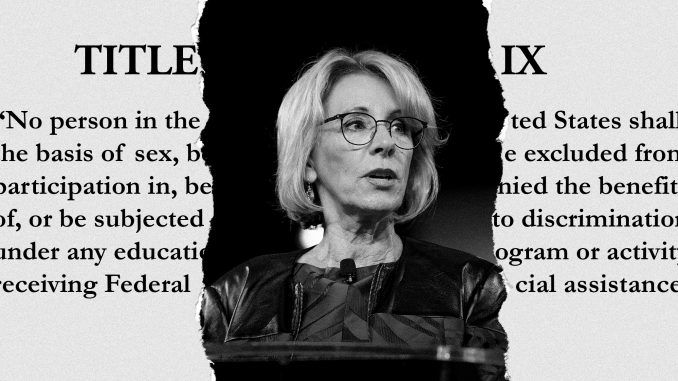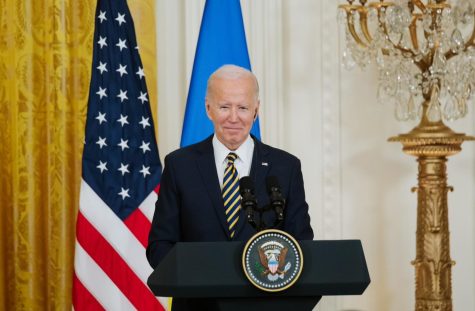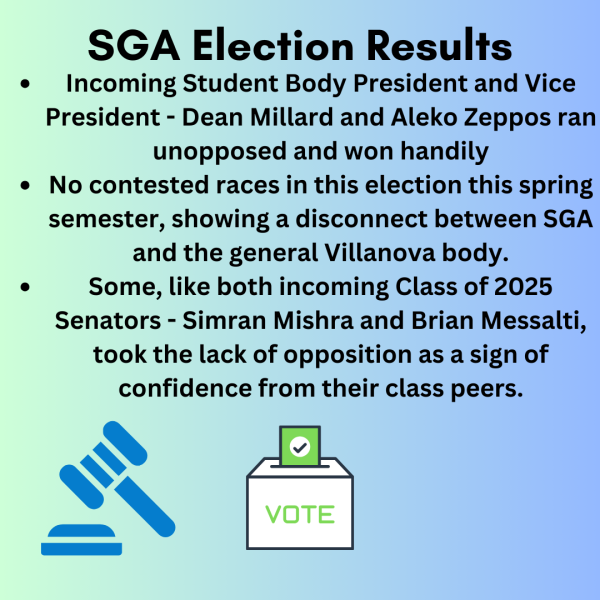DeVos Finalizes New Title IX Regulations, Set to Take Effect in August
Courtesy of Jeremiah Reardon / The Temple News
Secretary of Education Betsy DeVos updated regulations for universities dealing with sexual misconduct, bolstering due-process rights for the accused.
May 10, 2020
Last week, U.S. Secretary of Education Betsy DeVos finalized new federal regulations that lay out how schools must interpret the federal Title IX gender equity law. The new rules change requirements on who must report sexual allegations and how institutions respond to those complaints.
“It marks the end of the false dichotomy of either protecting survivors, while ignoring due process, or protecting the accused, while disregarding sexual misconduct,” Kenneth Marcus, assistant secretary of the Office for Civil Rights, said. “There is no reason why educators cannot protect all of their students – and under this regulation there will be no excuses for failing to do so.”
The adjustments, outlined in a 2,033-page document, are set to go into effect on August 14, 2020. Coaches and other employees at colleges will no longer be required to report allegations to the university’s Title IX office. They also give schools a choice in what standard for proof they would like to follow in investigations and trials and bolster protections for those accused.
“Too many students have lost access to their education because their school adequately responded when a student filed a complaint of sexual harassment or sexual assault,” DeVos said in a statement released by the Department of Education.
Some of the new changes in the regulations include narrowing the definition of what constitutes sexual harassment and mandating live hearings, during which those accused of sexual assault are given the new right to cross examine their accuser via a third party. DeVos claims these new regulations will make the investigation process smoother and provide better protection to students who have been accused.
“This new regulation requires schools to act in meaningful ways to support survivors of sexual misconduct, without sacrificing important safeguards to ensure a fair and transparent process,” she added. “We can and must continue to fight sexual misconduct in our nation’s schools, and this rule makes certain that fight continues.”
Under current Title IX guidelines, coaches, athletic directors and other team personnel are mandatory reporters of sexual misconduct. Faculty and residential life staff on college campuses are also required to report any instances of sexual misconduct or sexual discrimination to the Title IX office on campus or school officials, without the requirement of a formal complaint by a student.
This exact stipulation in the rules is what has caused many coaches and institutions fines for mishandling claims of abuse. Michigan State University was fined $4.5 million last September for its mishandling of reports against former osteopathic physician and USA Gymnastics national team doctor Larry Nassar.
DeVos’ new regulations drop the requirement for coaches and athletic trainers as mandatory reporters. Reports now are instead required to be made directly to the Title IX coordinator or an official with “authority to institute corrective measures.”
In the document, the federal government changed the rules to “respect the autonomy of students” to choose whether or not they wish to tell someone with the intent of filing a formal Title IX report. These changes will not formally stop coaches and other university leaders from reporting allegations of sexual misconduct and discrimination. Some coaches may have obligations to report through NCAA regulations and the U.S. Center for SafeSport, which applies to individuals competing in Olympic and Paralympic sports.
“The campuses will retain the responsible employee mandatory reporter standard that they have because that’s the better practice,” W. Scott Lewis, co-founder of the Association of Title IX Administrators, said via ESPN.
In 2014, the NCAA determined that athletics staff, coaches, administrators and student-athletes must “immediately report any suspected sexual violence to appropriate campus offices for investigation and adjudication.” Just last week, the NCAA adopted a new policy that requires schools to annually report acts of violence that resulted in an investigation, disciplinary action or criminal conviction.
Along with the change in stipulations for university athletic departments, the changes include a new definition for sexual harassment. The Department of Education and Title IX have adopted the Supreme Court’s definition of sexual harassment as “unwelcome conduct that is so severe, pervasive and objectively offensive.”
Schools are now only responsible for responding to incidents that reportedly happen on campus or in off-campus locations that are related to school activities, such as fraternities or school-supported events. Students studying abroad are excluded from these rules.
Live hearings will be required for allegations in a system that would better mirror legal proceedings in criminal cases and allow for cross-examinations. While students will not be allowed to cross-examine each other to challenge credibility, third party representatives (such as a lawyer or teacher) would be allowed to carry out the cross examination on behalf of the student.
Colleges now have more choice in what standard of proof they follow for investigations and trials — “clear and convincing evidence” or “preponderance of evidence.” Preponderance of evidence is defined as 51 percent of the evidence favors a finding of fault in a particular party. The rules also limit the complaints that schools are obligated to investigate to only those filed through formal processes and brought to the attention of officials with the designated authority to take corrective action, not other figures like residential advisers.
Democratic presidential candidate Joe Biden said in a statement last week that he would put a “quick end” to DeVos’ Title IX changes if elected, saying the new regulations give “colleges a green light to signore sexual violence and strip survivors of their rights.” As vice president, Biden led the Obama administration’s “It’s On Us” campaign against sexual assault on college campuses.
Victim advocacy groups also argue that the new rules will allow schools to ignore accusations of sexual assault and harassment.
“The final rule makes it harder for survivors to report sexual violence, reduces schools’ liability for ignoring or covering up sexual harassment and creates a biased reporting process that favors respondents and schools over survivors’ access to education,” Sage Carson, a member of Know Your IX, a group that combats gender violence in schools, said in a statement to BuzzFeed News.
The presidents of the National Women’s Law Center and NAACP said that the new Department of Education regulations threaten “racial and gender bias,” in a column published in the Atlanta Journal-Constitution.
“DeVos’s Title IX rules would make it harder for students who are sexually harassed to receive vital support and protection, while mandating unfair processes for investigating and addressing sexual harassment,” the NWLC’s Fatima Goss Graves and the NAACP’s Derrick Johnson wrote in the opinion editorial. “All these changes would particularly hurt black women and girls, who face even higher stakes when reporting sexual harassment.”
Under Villanova’s Sexual Assault, Sexual Harassment and Sexual Misconduct Policy, the University prohibits sexual harassment, sexual assault, sexual exploitation, stalking and retaliation. The policy also applies to acts of domestic or dating violence. As a recipient of federal funds, the University must comply with Title IX regulations.
For the University’s full policy, visithttps://villanova.policytech.com/dotNet/documents/?docid=1323
For the Department of Education’s new revised Title IX regulations, visit https://www2.ed.gov/about/offices/list/ocr/docs/titleix-regs-unofficial.pdf
For a summary of the changes, visit https://www2.ed.gov/about/offices/list/ocr/docs/titleix-summary.pdf













